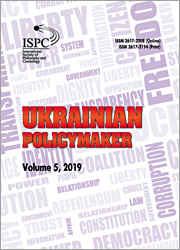The Features of German Think Tanks Development and Their Interactions with the Authorities
The Features of German Think Tanks Development and Their Interactions with the Authorities
Author(s): Ihor PetrenkoSubject(s): Politics / Political Sciences, Social Sciences
Published by: Международное философско-космологическое общество
Keywords: public policy;political decision;think tanks;political consultancy;political analysis;
Summary/Abstract: The features of the German think tanks development and their interaction with the authorities are analyzed in the article. The etymologization of German think tanks, in particular by such criteria as type of activity (general or speciality), place of operation (open at universities, at foundations and as separate institutions), by scientific orientation (practical, fundamental), by sources of funding (funded by government, land or individuals) is carried out. It is determined that the basis of German think tanks are political foundations — institutions unique in terms of organizational, legal and political form, which have no analogues in the world either in terms of the effectiveness of domestic political work or the scale of their presence abroad. Since their inception, these funds have belonged to one party or another, but they are now independent non-governmental organizations. In Germany, think tanks are effective and proven instruments of foreign and domestic policy. They complement the public policy of the state, and in some cases even implement (or promote) it in areas where the state is powerless. As non-governmental organizations, they may be involved in areas that are not accessible to the official government. It is established that academic think tanks and centers in Germany have a broad list of areas of activity and have an equal (average) impact on the political process. Depending on the transition from the first to the second and third stages, the influence of the contract centers is amplified and reaches its maximum at the stage of implementation of political decisions. Public interest protection centers and party think tanks, by contrast, are most influential in the first stage — the formulation of problems and the agenda for public policy. Thus, with the increase of the autonomy of the analytical communities, the opportunities for influencing the first stage of the political process increase, when, in fact, interests are taken into account on the agenda and alternative solutions of political problems are laid down.
Journal: Ukrainian Policymaker
- Issue Year: 5/2019
- Issue No: 5
- Page Range: 61-67
- Page Count: 7
- Language: English

